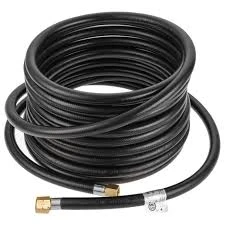335345435
Oct . 18, 2024 07:18 Back to list
High-Quality LPG Gas Hose for Safe and Efficient Gas Connections
Understanding LPG Gas Hoses Safety, Types, and Maintenance
Liquefied Petroleum Gas (LPG) is a popular fuel choice for various applications, including heating, cooking, and even powering vehicles. To safely transport LPG from tanks to appliances, high-quality LPG gas hoses are essential. This article delves into the importance of LPG gas hoses, the different types available, safety guidelines, and maintenance tips to ensure optimal performance.
Importance of LPG Gas Hoses
LPG gas hoses serve a critical function in the safe delivery of gas. They are designed to handle high pressure and are often composed of flexible materials that can withstand harsh environmental conditions. The right hose allows for the smooth flow of gas while preventing leaks, which can lead to dangerous situations, including explosions and fires.
Types of LPG Gas Hoses
LPG gas hoses come in various types, and choosing the right one depends on the application and environment. Here are some common types
1. Rubber Hoses These are the most common and versatile type. They are flexible, durable, and resistant to abrasion and UV rays. Rubber hoses are suitable for most LPG applications, including outdoor use. However, prolonged exposure to certain chemicals can degrade rubber, so it is essential to monitor the hose's condition.
2. PVC Hoses Made from polyvinyl chloride, PVC hoses are lightweight and resistant to corrosion. However, they may not be as flexible as rubber hoses, and their performance can degrade in extremely high or low temperatures. PVC hoses are often used for indoor applications where exposure to harsh environmental conditions is minimal.
3. Stainless Steel Braided Hoses For high-pressure applications, stainless steel braided hoses provide additional strength and durability. They offer excellent resistance to punctures and abrasions and are capable of operating in high-temperature environments. However, they can be more expensive than rubber or PVC options.
4. Composite Hoses These hoses are made from multiple layers of different materials, offering a balance of flexibility and durability. Composite hoses are often used in industrial settings where versatile performance and resistance to various chemicals are required.
Safety Guidelines
When working with LPG gas hoses, safety should be a top priority. Here are some essential safety guidelines
lpg gas hose

- Regular Inspections Regularly check hoses for signs of wear and tear, such as cracks, leaks, or bulges. Replace any damaged hoses immediately to prevent accidents.
- Correct Installation Ensure hoses are installed correctly, with appropriate fittings and connections. Loose connections can lead to leaks.
- Avoid Overuse Every hose has a specific pressure rating. Avoid exceeding these limits to prevent hose failure.
- Proper Storage Store hoses in a cool, dry place away from sunlight and chemicals that could degrade the material. Coiling hoses neatly can prevent kinks and damage.
- Know the Standards Familiarize yourself with local regulations and standards for LPG hoses to ensure compliance and safety.
Maintenance Tips
Proper maintenance of LPG gas hoses is vital for safety and longevity. Here are some tips
- Cleaning Clean hoses regularly to remove dirt and debris. Use a damp cloth and avoid harsh chemicals that can damage the material.
- Replacement Schedule Even if hoses appear to be in good condition, consider establishing a replacement schedule based on the manufacturer’s recommendations or usage frequency.
- Professional Assistance If you are unsure about the condition of your hoses or need to install or replace them, seek the help of a professional.
Conclusion
LPG gas hoses are an essential component in the safe transport and usage of liquefied petroleum gas. By understanding the types available, adhering to safety guidelines, and performing regular maintenance, users can ensure the integrity and effectiveness of their LPG systems. Safe handling of LPG not only protects users but also contributes to overall safety in homes and industries alike.
-
SAE 100 R17 Black Smooth Cover Hydraulic Hose
NewsMar.07,2025
-
SAE 100 R17 Black Smooth Cover Hydraulic Hose
NewsMar.07,2025
-
SAE 100 R17 Black Smooth Cover Hydraulic Hose
NewsMar.07,2025
-
SAE 100 R17 Black Smooth Cover Hydraulic Hose
NewsMar.07,2025
-
SAE 100 R17 Black Smooth Cover Hydraulic Hose
NewsMar.07,2025
-
steel wire braided hydraulic hose
NewsMar.07,2025



